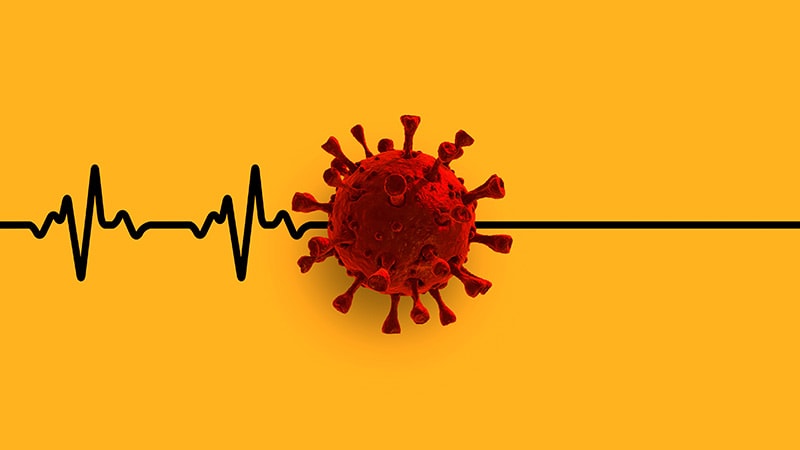COVID-19 Virus Directly Infects Coronary Vasculature
Konsep Inti
SARS-CoV-2 infects coronary vasculature, leading to plaque inflammation and increased cardiovascular risk post-infection.
Abstrak
TOPLINE:
- COVID-19 infection linked to increased risk of ischemic cardiovascular complications.
METHODOLOGY:
- Study analyzed 27 coronary autopsy specimens from COVID-19 patients.
- Majority had cardiovascular risk factors and coronary artery disease.
- SARS-CoV-2 viral RNA found in coronary vasculature.
TAKEAWAY:
- Evidence of viral replication in all analyzed coronaries.
- Infection rate highest in early-stage lesions.
- Inflammatory response in macrophages and foam cells contributes to complications.
IN PRACTICE:
- SARS-CoV-2 infects and replicates in macrophages within coronary vasculature.
- Foam cells may act as reservoirs for viral debris in atherosclerotic plaque.
SOURCE:
- Study led by Natalia Eberhardt, PhD, published in Nature Cardiovascular Research.
LIMITATIONS:
- Findings specific to original SARS-CoV-2 strains in New York City.
DISCLOSURES:
- Study supported by NIH, no relevant financial relationships reported.
Kustomisasi Ringkasan
Tulis Ulang dengan AI
Buat Sitasi
Terjemahkan Sumber
Ke Bahasa Lain
Buat Peta Pikiran
dari konten sumber
Kunjungi Sumber
www.medscape.com
COVID-19 Virus Infects Coronary Vasculature
Statistik
All but one patient hospitalized for an average of 17.6 days.
More than 79% of macrophages and over 90% of foam cells were S+.
More than 40% of both cell types were S antisense+.
Kutipan
"Our data conclusively demonstrate that SARS-CoV-2 is capable of infecting and replicating in macrophages within the coronary vasculature of patients with COVID-19."
Wawasan Utama Disaring Dari
by Pauline Ande... pada www.medscape.com 09-29-2023
https://www.medscape.com/viewarticle/996964
Pertanyaan yang Lebih Dalam
How can these findings impact the treatment of COVID-19 patients with cardiovascular complications?
The findings of this study have significant implications for the treatment of COVID-19 patients with cardiovascular complications. Understanding that SARS-CoV-2 directly infects the coronary vasculature and causes plaque inflammation provides valuable insights into the mechanisms underlying the increased risk of ischemic cardiovascular complications in COVID-19 patients. Healthcare providers can use this knowledge to tailor treatment strategies for these patients, focusing on managing inflammation in the coronary arteries and potentially reducing the risk of myocardial infarction. Targeted therapies that address the viral impact on the vasculature, such as anti-inflammatory agents, may be considered to mitigate the cardiovascular consequences of COVID-19.
What are the implications of the study's limitations on broader COVID-19 research?
The limitations of the study, particularly its focus on the original strains of SARS-CoV-2 in a specific population, have implications for broader COVID-19 research. Generalizing the findings to other populations or viral variants may not be appropriate, limiting the broader applicability of the results. Researchers conducting future studies on COVID-19 and its cardiovascular effects should consider the diversity of viral strains and patient populations to ensure the relevance and generalizability of their findings. Collaborative efforts across different regions and demographics can help overcome these limitations and provide a more comprehensive understanding of the cardiovascular implications of COVID-19.
How can the understanding of viral impact on vasculature inform future pandemic preparedness strategies?
The understanding of how SARS-CoV-2 impacts the vasculature, as demonstrated in this study, can inform future pandemic preparedness strategies in several ways. First, it highlights the importance of considering cardiovascular complications in the management of infectious diseases, especially respiratory viruses like COVID-19. Healthcare systems can incorporate protocols for monitoring and treating cardiovascular issues in patients with viral infections to improve outcomes and reduce long-term complications. Additionally, the identification of specific mechanisms by which the virus affects the vasculature can guide the development of targeted therapies and preventive measures for future pandemics. By recognizing the potential impact of viral infections on cardiovascular health, public health authorities can enhance preparedness efforts and better protect vulnerable populations during outbreaks.
0
